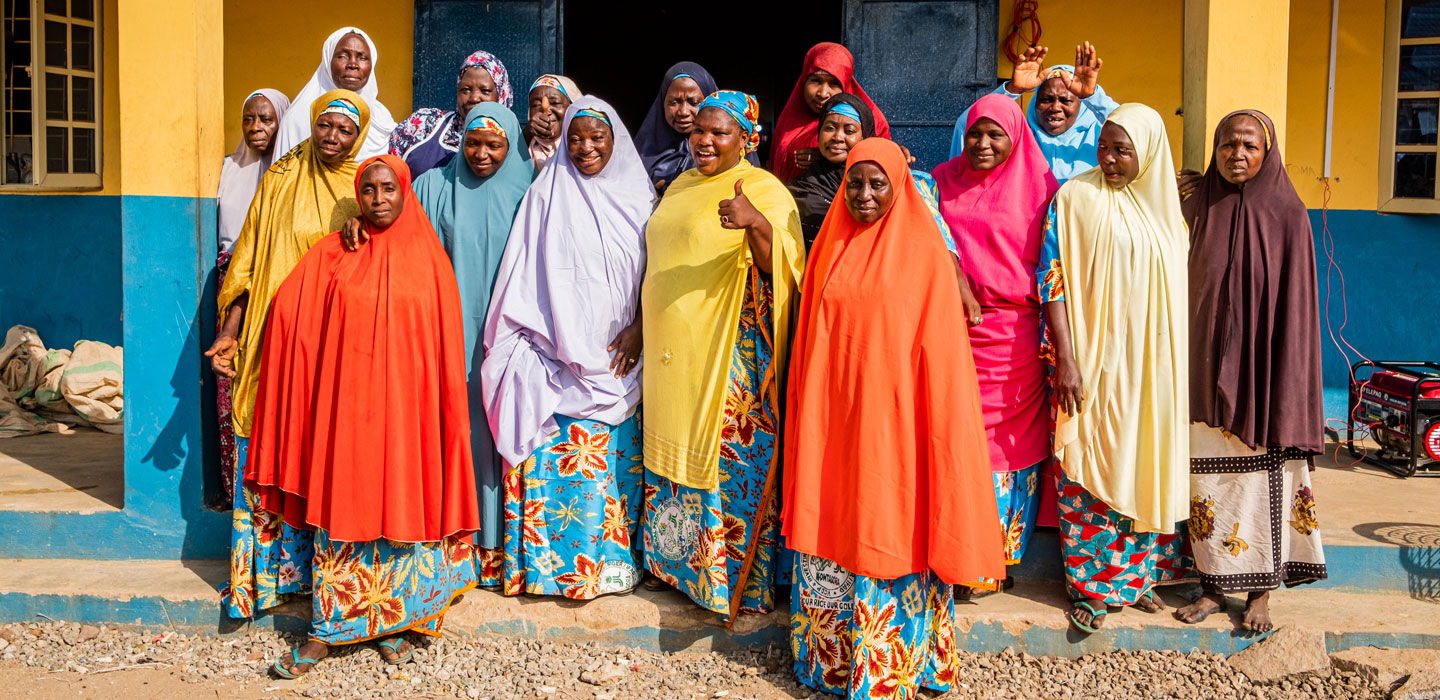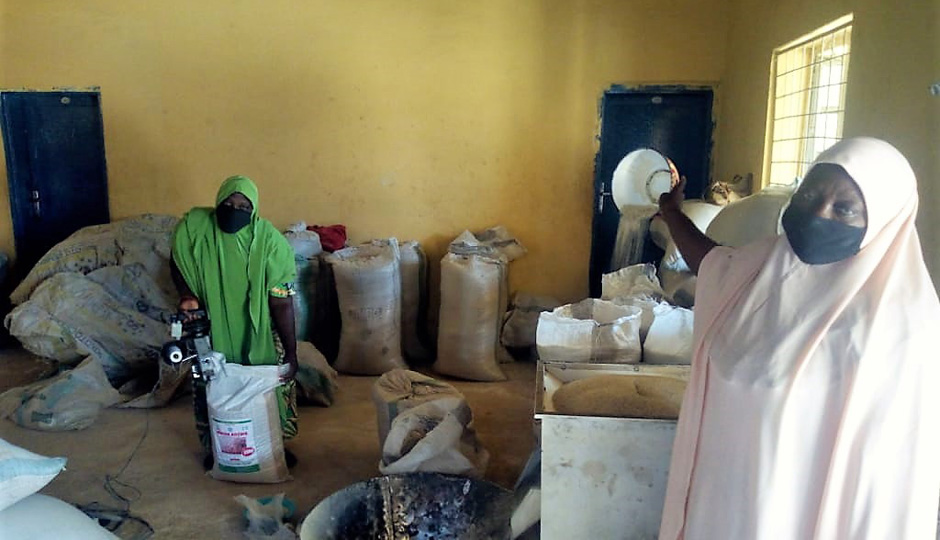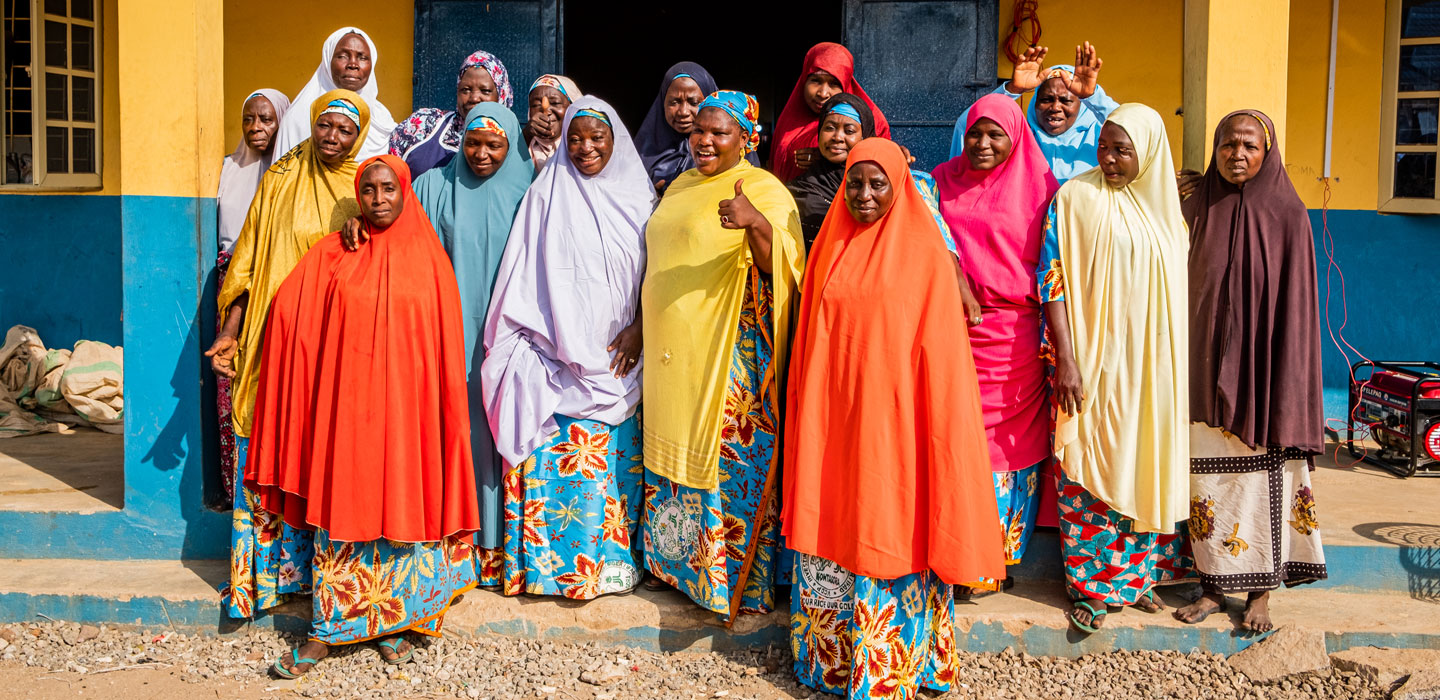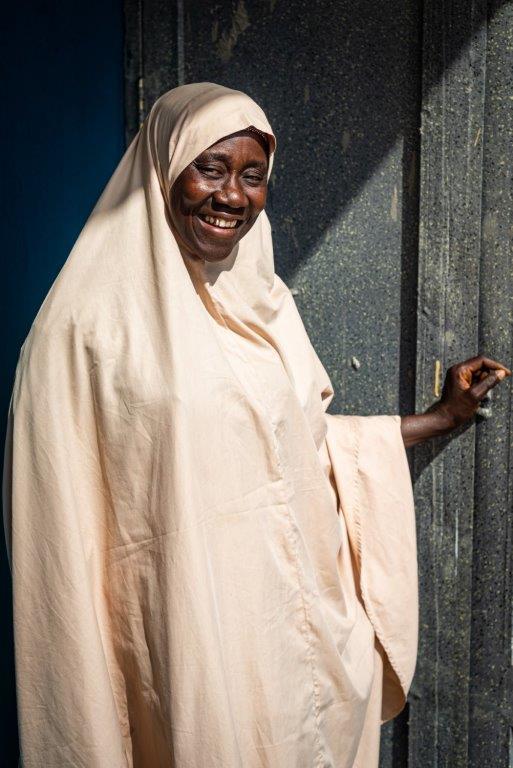Empowering and protecting rural women in the time of coronavirus
IFAD Asset Request Portlet
Asset Publisher
Empowering and protecting rural women in the time of coronavirus
Estimated reading time: 4 minutes
The April morning sun beats down on Kontagora, a lively market town in central Nigeria. Generators hum as milling machines husk the brown bran from rice grains, revealing glistening white kernels. COVID-19 is on everybody’s mind. But the thriving Tudun Wada South Rice Processors women’s cooperative is open for business.
Here in Kontagora, small-scale processors are continuing to do their part to help meet Nigeria’s food needs.
Asabe Danjuma is the Chairperson of the flourishing cooperative. Thanks to the Value Chain Development Programme (VCDP), a joint effort between IFAD, the Government of Nigeria and the private sector, Asabe and her 75-member-strong cooperative have seen life-changing transformations in their community. The women have built a sustainable business that has created jobs and increased incomes in their community – and also contributes to the country’s food security.
As in other parts of the world, the precautionary measures taken by the government have presented challenges for commercial activity in Kontagora. Asabe has worked quickly with the women of the cooperative to develop a strategy that allows them to continue processing and selling rice, operating within the established restrictions and safety measures.
“We split ourselves into three sub-groups in order to reduce the number of people inside the processing center at a time,” Asabe says. “Then each group is given a day to go in to process rice. We use face masks since it is usually part of our dressing kits when processing our rice.”
 |
| Rice processing continues during the COVID-19 crisis with cooperative members polishing and bagging rice. |
The cooperative has been able to reconcile this busy marketplace with the need to safeguard health. “We use face masks since it is usually part of our dressing kits when processing our rice. The issue of social distancing is automatically addressed because we employ division of labor. Some of the women are washing paddy, some are parboiling, others are drying, milling, destoning or packaging in their sections respectively.”
The women start their morning at 7:00 a.m. and remain inside the fenced processing centre during the hours when movement is restricted. Asabe explained how the cooperative is maximizing their efficiency. “Our customers come to the processing center between 8:00 and 9:30 a.m. to buy our rice. We strictly adhere to the guiding principles in curtailing the spread of COVID-19, such as regular hand-washing and use of hand sanitizers.” At the mill’s entrance, customers wash and sanitize their hands as well. Thanks to a borehole drilled by VCDP, there is no lack of fresh, clean water.
The women are busier than ever, in fact, because of people rushing to stock up and the resulting increased demand for staple foods. “Greater demand is putting more money in our pockets,” Asabe adds.
Growing to meet demand
Construction workers busily saw and hammer amid the hustle and bustle of rice farmers delivering their paddy to the Tudun Wada South Rice Processors women’s cooperative. After only two years in business, they are already expanding their milling facility.
 |
|
Asabe Danjuma (centre), together with some of the cooperative members. |
This expansion would not have been possible without steady improvements in technology. The women used to boil paddy in large vats of water, processing only about one ton of rice per day. Some of the rice grains broke, became discolored or even burnt, which lowered the market value, making it difficult to compete with higher-quality imported rice.
The problem Asabe and other processors faced was not a lack of quality paddy, however. Back in 2015, IFAD-VCDP had introduced local farmers to Faro 44, a rice variety known for its long grains. With this improved certified seed and training in better cultivation practices, their yields increased threefold and the quality of harvested paddy improved.
Yet despite the abundance of high-quality paddy available, they lacked adequate technology to process the rice to meet international standards. That changed in November of 2017, when IFAD-VCDP provided the cooperative with mechanized processing equipment.
The new machinery included innovative “false-bottom” parboilers, which steam rather than boil the rice, as was done traditionally. The method results in a more attractive and durable product that also retains its vitamins and minerals, thus enhancing its nutritional value.
The project provided training to more than 4,000 women on how to use the new false-bottom technique. With the new parboilers, the women can work more efficiently, producing up to 30 tons per day of a high-quality rice for which there is an insatiable market in Nigeria. The cooperative has gone from taking what they can get for an inferior product to hardly being able to meet the demand – and at a much higher price.
 |
|
Hajara Mohammed, Chairperson of the Doko Yegborolo Multipurpose Cooperative Society. |
“We’d been in the rice business for more than 20 years with nothing to show for it,” says Hajara Mohammed, Chairperson of the Doko Yegborolo Multipurpose Cooperative Society in nearby Bida. “But within just two years, IFAD-VCDP has made us rich! People come to us even before we finish processing. We are expanding our business and employing people to work and be paid because we need more hands to be able to meet market demand.”
Asabe takes pride in what the women’s cooperative has accomplished – and in the sustainable future they can look forward to. “The sky is our limit,” she says. “We are going to continue to grow to compete with other bigger companies. Here, we are only women in our cooperative, and we are up to the standard.”
She points to the workers and notes, “We are building this new milling shed with the money we have earned, without the financial support of the project. After just two years, our business is already completely sustainable. When the project closes, we are good to go!”
Read more about IFAD’s response to COVID-19.
Learn more about IFAD’s work in Nigeria.
Publication date: 04 May 2020